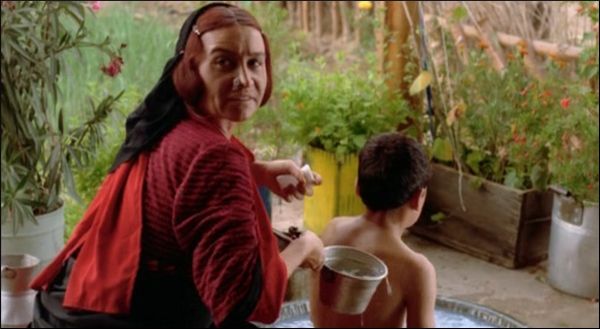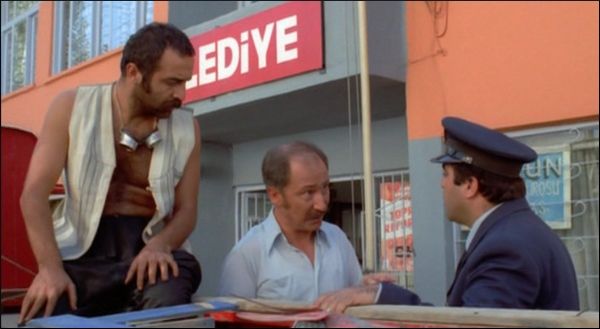The story takes place in a small village in South-eastern Turkey during the 1970s. People live far away from the big cities and hear the news only through the radio. Their only source of fun is watching outdoor cinema. One day, television arrives along with a government committee from the capital city of Ankara. But the technician who is supposed to perform the installation simply tells villagers to set up the receiver on a high place in order to make the television units work. Latif (Cezmi Baskın), the owner of an outdoor cinema, thinks television will destroy his job because everyone will be able to watch movies inside their houses. He starts to claim it will bring “evil” to the town and engages religious believers to stop the installation. The town mayor, Nazmi (Altan Erkekli), is trying to modernize the village and is happy about the arrival of television, so he chooses to oppose Lati. He calls Deli Emin (“Crazy” Emin, played by Yılmaz Erdoğan), the village electrician, but together they can’t complete the installation, so the villagers start to make fun of them. Remembering the technician’s words, they decide to put the receiver on the highest place possible, which is at the top of a mountain, and thus Mayor Nazmi, Deli Emin, and some members of the mayor’s office begin their journey to the mountaintop.
"Vizontele portrays the both funny and dramatic life of the south-easterners in Turkey."
The movie is mostly based on writer, director, and star Yılmaz Erdoğan’s childhood memories. Even though the movie is set in Van, a southern Turkish city, his actual memories are from a village in the south-eastern province of Hakkari, where Erdoğan was born. Because they were far from modern cities, Turkish villagers had fewer chances to catch up with the world until the 1980s. Newspapers arrived two or three days after they were released and radios worked only at night. Villagers ate on the floor, placing newspapers below their plates and glasses, as tables and chairs were not common. Religion was dominant, and all kids went to religion courses that taught the Quran. When something Western or modern came to town, the village elders and the rich used to believe that it was evil and were against it. The local imam, in the film, even starts to say “Television is evil and watching it is a sin” after the outdoor cinema owner bribes him.

Television is a Western word. When the mayor receives news that the government committee will come, television – which is “televizyon” in Turkish – becomes “vizontele.” Before the committee arrives, the mayor recites a speech to the villagers explaining the installation to them, and as he needs to describe what television is, he says it’s a “radio with images” and that they will “not just listen to Zeki Müren [a very famous singer of the time] but also will see him.” After this, a serious question is brought up by one of the villagers, Fikri (Cem Yılmaz): “O da bizi görecek mi?” (Will he see us too?). This quote became very popular after the move was released, and Turkish people have started to use it in their daily life. When someone is getting ready to go to a concert and he or she says “I will see him/her,” others will suddenly respond: “Will he/she see you too?”
"The movie is mostly based on writer, director, and star Yılmaz Erdoğan’s childhood memories."
When the committee travels to the small village from Ankara, the villagers organize a welcoming festival by dancing, playing music, cooking food, preparing drinks, and sacrificing animals. For them, the visit means that the government is thinking about them. But, when the committee from Ankara arrives, one of the committee members doesn’t want to stay, because it’s too hot and dirty and the people are not modern. This is when, as mentioned earlier, the technician tells the villagers to place the receiver on the “highest place,” which goes to show how some westerners thought southerners were ignorant during those times. Before this scene, as the committee tries to find the village, it finds some drunkards on the way. The technician asks for directions, and the drunkards give them to him and also offer a glass of alcohol. The technician drinks the whole glass in one go, and the drunkards say “Güzel iciyor” (Drinks beautifully), an expression used when someone drinks alcohol very quickly. In another scene, Deli Emin, the electrician, asks his friend what he’s doing, and his friend replies: “Hiç” (Nothing). To which Deli Emin counters “Hiç iş değil ki” (Nothing is not something you do). Saying “Hiç” was a popular answer for questions such as “What’s up?” or “What’s going on?,” but after this movie this habit started to change.
Vizontele portrays the both funny and dramatic life of the south-easterners in Turkey. It was one of the most watched Turkish movies, with more than 3.5 million viewers in its home country.





